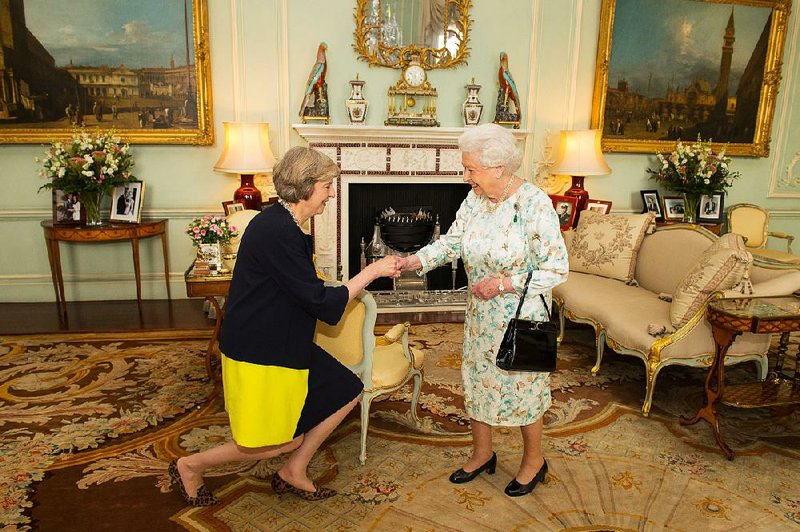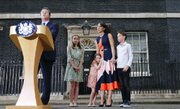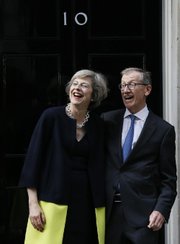LONDON -- Theresa May entered No. 10 Downing St. on Wednesday as Britain's new prime minister and quickly got to work setting up her Cabinet.
It was a bittersweet moment for her predecessor David Cameron. "I was the future once," he quipped as he officially left office.
May enters office at a time of instability and uncertainty and faces some tough wrangling over Britain's departure from the European Union.
Britain's transition of power came after the country's June 23 referendum on EU membership. Cameron announced his resignation after voters rejected his appeal to stay in the 28-nation bloc.
May, the former home secretary, became Conservative Party leader Monday after an abbreviated contest in which her only remaining rival dropped out.
Wednesday's ceremonial choreography included two trips to Buckingham Palace and two audiences with Queen Elizabeth II that ended with one prime minister out of a job and a new one curtsying to the monarch to begin her term.
May's task now is to manage Britain's exit from the EU and possibly a recession that has been predicted as the prospect of the exit sends a chill through markets and the global business community.
The pound has fallen 11 percent in the past three weeks, consumer sentiment has plunged the most since 1994 and companies from Vodafone Group to JPMorgan Chase say they are considering moving jobs abroad.
May stood in front of No. 10 Downing St. with her husband, Philip, as the 13th prime minister of the queen's reign and the first woman to hold the job since fellow Conservative Party member Margaret Thatcher served from 1979-90.
She acknowledged that Britain faces a rocky road as it undoes 43 years of EU ties and forges a new relationship with its neighbors.
"Following the referendum, we face a time of great national change," May said. "And I know because we're Great Britain we will rise to the challenge.
"As we leave the European Union we will forge a bold new positive role for ourselves in the world, and we will make Britain a country that works not for a privileged few, but for every one of us," she said.
The focus of her speech wasn't on the EU exit or the economy. Instead, it was on the people who are increasingly angry with the political class.
"If you're from an ordinary working-class family, life is much harder than many people in Westminster realize," she said. "You have a job, but you don't always have job security. You have your own home but you worry about paying the mortgage. If you are one of those families, if you're just managing, I want to address you directly. I know you are working around the clock, I know you're doing your best and I know that sometimes life can be a struggle."
May's Cabinet
Within an hour of taking office, May began appointing her new Cabinet, and several positions went to people who supported the country's EU exit.
The most notable appointee was former London Mayor Boris Johnson, who was given the job of foreign secretary, Britain's top diplomatic post. The blond, Latin-speaking Johnson -- a leader of the campaign for the British exit, or Brexit -- had for a time aspired to be prime minister, but his bid failed because of party infighting.
Former Foreign Secretary Philip Hammond was named Treasury chief, replacing George Osborne, who had urged the nation to remain in the EU. May's former job of home secretary went to Amber Rudd.
May, 59, has said she will create a new post of "Brexit" minister to oversee talks on the country's exit from the EU. That job went to veteran Conservative Party lawmaker David Davis -- a long-standing advocate of leaving the EU. He will lead at least two years of negotiations with the bloc.
Wednesday's political changeover began with Cameron making a final appearance in Parliament. The usually raucous prime minister's question time became a session filled with praise, thanks, gentle ribbing, cheers and a sprinkle of criticism.
Later, in a brief speech on Downing Street, Cameron, 49, said "It has been the greatest honor of my life to serve our country as prime minister over these last six years and to serve as leader of my party for almost 11 years.
"It's not been an easy journey, and of course we have not got every decision right, but I do believe that today our country is much stronger," he said.
Then, he and his wife, Samantha, and children 12-year-old Nancy, 10-year-old Elwen and 5-year-old Florence left the official residence and made the short drive to Buckingham Palace.
The palace soon confirmed that Cameron had "tendered his resignation as prime minister and First Lord of the Treasury, which her majesty was graciously pleased to accept."
Minutes later, the palace released a photo of May curtseying to the monarch and confirmed that the queen had "requested her to form a new administration."
As home secretary, May has been in charge of immigration, and law and order for the past six years.
Although she had supported remaining in the EU, she has reassured people who supported leaving it that "Brexit means Brexit, and we will make a success of it."
Not all believe her. As May spoke in front of her new residence, a small group of pro-exit demonstrators down the street chanted "Theresa May, don't delay!"
She is under pressure from exit-supporting Conservatives and other EU leaders to start formal exit talks. But Tony Travers of the London School of Economics said May probably will not rush to trigger Article 50 of the EU constitution, which starts the clock ticking on a two-year countdown for the departure.
"I don't detect Theresa May being an impulsive person," Travers said. "I think she's a cautious person, and the British political establishment needs to come to terms with this massive decision."
EU official weighs in
European Commission President Jean-Claude Juncker said Wednesday that he would miss Cameron, although the two's relationship got off to a rocky start.
Two years ago, Cameron tried to block Juncker from becoming president of the commission, the body that proposes EU legislation and represents the bloc on the international stage.
Juncker told reporters recently in Beijing that the two had had "an excellent professional and personal relationship since I am president of the commission, but not before," and that he had "no beef" with Cameron.
"I have experienced a man who is serious, who is a fan of no-nonsense policy and who was delivering at each and every moment when things started to become serious," Juncker said.
Cameron said two years ago that Juncker was a longtime Brussels insider who was chosen to be European commissioner in a "backroom deal." He had warned other EU leaders that electing Juncker would undermine Cameron's attempts to persuade Britons that the EU could be changed and would make them more likely to vote to leave the union.
May was quoted by British media this week as saying she is "a bloody difficult woman, and the next man to find that out will be Jean-Claude Juncker." Her phrase "bloody difficult woman" was a reference to a recent unguarded assessment of her by a former British minister that was picked up on camera.
In response, Juncker said: "I don't want to talk about her before I have talked with her." He added that he thought their relationship had "the potential to become a good [relationship]."
Labor Party leader
Jeremy Corbyn's hopes of remaining head of the U.K. Labor Party received a boost when the party's governing body -- the National Executive Committee -- ruled that he will automatically be in the leadership contest, instead of having to gather support to enter it.
Meanwhile, his challenger for the position -- former business spokesman Angela Eagle -- must secure about 50 nominations from Labor Party legislators to enter the leadership contest. That's a support level Corbyn might have struggled to match given that he recently lost a no-confidence vote by 172-40.
Tensions in the country are running high.
Corbyn said Tuesday that he has received death threats over the past few weeks, and police said they're investigating "criminal damage" at Eagle's constituency office in northwest England. In an emailed statement, Corbyn appealed for calm.
Eagle, speaking in a BBC TV interview, said the damage to her office had been done in Corbyn's name, and he should "get control" of his supporters. "It's bullying. It has absolutely no place in politics in the U.K., and it needs to end," she said.
Scotland's concerns
Scotland's First Minister Nicola Sturgeon challenged May over her assertion that the new British government must prepare to leave the EU.
Sturgeon, speaking Wednesday in London, said she would be seeking talks with the new prime minister within the next couple of days, and she would make the case that Scottish interests must be represented. Whereas the U.K. as a whole voted on June 23 to leave the EU, every district of Scotland voted to stay in the bloc.
"That mandate to say 'Brexit means Brexit' does not apply to Scotland because Scotland voted differently in this referendum," Sturgeon told reporters. "As first minister of Scotland, just as Theresa May has a mandate, I too have a mandate, and that mandate is to respect the wishes of the people in Scotland and now to find a way to keep Scotland in the European Union."
Sturgeon, who met with Bank of England Gov. Mark Carney early Wednesday, said she would be seeking a commitment from May that the Scottish government has "a very direct, full role in the process."
"Our involvement in that process is not simply to prepare for an exit Scotland didn't vote for," said Sturgeon, who leads the pro-independence Scottish National Party.
"The U.K. is heading into a very uncertain and challenging and potentially unstable period," she said. "It may be that the way for Scotland to chart our own way is through independence and that will be a very different debate."
Information for this article was contributed by Jill Lawless, Danica Kirka, Louise Watt and Gerry Shih of The Associated Press; and by Robert Hutton, Thomas Penny, Charlotte Ryan, Alex Morales, Joe Mayes and Charlotte Ryan of Bloomberg News.
A Section on 07/14/2016


